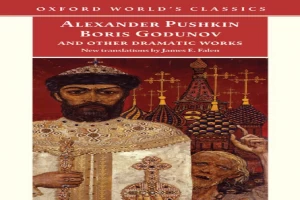Newly released
This book is new and will be uploaded as soon as it becomes available to us and if we secure the necessary publishing rights.

Boris Godunov and Other Dramatic Works Book PDF
(0)
Author:
Alexander PushkinNumber Of Reads:
271
Language:
English
Category:
literatureSection:
Pages:
249
Quality:
good
Views:
1757
Quate
Review
Save
Share
Book Description
Alexander Pushkin
Alexander Pushkin, a renowned poet, novelist, and playwright, was born in Moscow on June 6, 1799. Raised in an aristocratic family, he lived a life of luxury. His father, a prominent poet himself, played a significant role in nurturing Alexander's poetic talent. Interestingly, Pushkin's ancestry can be traced back to Ethiopia. His mother, Nadezhd Osipavna, was the granddaughter of Ibrahim Janipal, an African who served as a close officer to Tsar Peter I. As a result, Pushkin inherited some African features, including curly hair and thick lips.
Pushkin is hailed as one of the greatest Russian poets of the nineteenth century and is often referred to as the "Prince of Poets." The study of his poetry leads to a deeper understanding of Russian literature as a whole, as well as the historical events that unfolded during the first half of the nineteenth century, spanning the reigns of Tsar Peter I to Nicholas I.
His era, known as the golden age of Russian poetry, witnessed a convergence between Russian, Arabic, and Oriental literature. However, it was also marked by social despotism, with power concentrated between the Tsar and the nobility. Through his poetic works, Pushkin expressed his discontent with the societal order and called for freedom and democratic principles for the people. He was a trailblazer in advocating for limiting the power of the Russian nobility and pushing for a more democratic system among the people.
Tragically, Pushkin's life was cut short at the age of 38 due to a duel sparked by his resentment towards Baron Datin, a friend of his wife. The duel resulted in serious injuries, and Pushkin succumbed to them in 1837. Nevertheless, he left an indelible literary legacy, and his readers still feel the profound impact of his works to this day, as if he has transcended his own lifetime.
Book Currently Unavailable
This book is currently unavailable for publication. We obtained it under a Creative Commons license, but the author or publisher has not granted permission to publish it.
Rate Now
5 Stars
4 Stars
3 Stars
2 Stars
1 Stars
Boris Godunov and Other Dramatic Works Quotes
Top Rated
Latest
Quate
Be the first to leave a quote and earn 10 points
instead of 3
Comments
Be the first to leave a comment and earn 5 points
instead of 3